-- Blog 7 --
28th February 2025
28th February 2025
Brief blog just to say I've joined the revolution, I'm now on Bluesky.
Haven't yet followed the mass exodus from the platform formerly known as Twitter, I'm still seeking/taking advice on the matter whilst trying not to make it political. It's difficult I know.

But anyway, Bluesky, let's see what that's all about. And what better theme for an inaugural post, than a shameless book plug.
Bluesky Handle: @AmesburyClarke
-- Blog 6 --
11th February 2025
11th February 2025
Well I'm FINALLY getting round to editing some of my poems! Excitement much!
I have literally hundreds of poems which I've written over the years, and I've never don't anything entirely productive or useful with them, as regards sharing them. I'd always planned to organise them and arrange them into a book or two, or three, but just never found the time. So over these past few weeks that's exactly what I've been doing, organising.
The level of disorganisation we're tackling here, I cannot even begin to explain. I have poems written in notebooks, some written on post-it-notes, some on chocolate bar wrappers and on the backs of envelopes. I even have one which I'd originally scribbled on a tea-box, and one on an old bus-ticket. I guess when a poem pops into your mind you've just got to write it down quickly on whatever platform you have to hand.
Some of the poems are recent, but others must be 10 or 15 years old, possibly more.
The task at hand now, is to organise them all, filter out the gems from the rubbish, and to undertake some re-editing wherever necessary. And then, once the task is complete, hopefully we shall have ourselves a book.
As a sneak preview, in case like me you're just too excited to wait, you can now find a "Poems" link at the top of this website, where a small sample of poems can be read and enjoyed. Once the book itself is ready, it's likely to be an epic, containing hundreds more like them. There's many MANY more still waiting to be rediscovered and shared.
Oh, and before I forget, happy new year everyone! (belatedly...)
-- Blog 5 --
24th Sep 2024
24th Sep 2024
Are there any other dyslexic authors out there, or any who have overcome the hindrances and become a success?
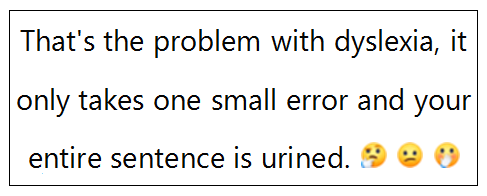
How can a dyslexic person write for a living?
With determination and the ability to adapt!
At least that is how I learnt to operate. I was raised and schooled in an era where dyslexia did not exist, or at least it had not yet been identified. If you struggled to read at school you were just labelled as a slow reader, or bad at spelling. But despite dyslexia, all the way through school I was in the top set for English, and I achieved the necessary grades in both English language and English literature. I did not excel at foreign languages, which was simply a step too far, but with English I found ways to function and to make the task of writing and reading a lot easier.
Nowadays there is a lot more help available for dyslexic students, and indeed for adults who have progressed into the world of work. People in general are a lot more aware of dyslexia and it is now very easy to identify, assess and support.
I had progressed through infant's school, junior's, senior's and college, undiagnosed. Not once had any teacher or tutor ever mentioned the D-word. It was only as a mature student at University where a lecturer finally looked over my shoulder one day, and with calmness and sincerity in his voice, he asked me if I am dyslexic. I smiled humbly, and responded with, "I'm pretty sure I am." By that point in life I had known for some time if truth be known, but I had never previously been assessed. And I was aware by that point in life, having worked in an IT office job in a college, that there was now, finally, a lot of support available to help dyslexic students. The college at which I became an employee had an entire department dedicated to study support, with a sizeable team of support staff available to help any student with support needs. Every student who enrolled at the college received some form of assessment to determine any support needs. This was an unexpected surprise for me to witness, as I realised there and then that I had been brought up and educated in the dark ages. But witnessing how the modern day college staff helped the students with a wide and varied assortment of study support needs was a very refreshing sight to see, and it helped me to learn more about myself and the struggles which I had faced.
But back to my university life as a mature student, even now that I knew I was dyslexic, I never once asked for concessions or special consideration. For example, whilst sitting exams, dyslexic students can request additional time in which to sit the exam. My opinions have always been however, that such concession would give me an unfair advantage over the non-dyslexic students. That's just who I am. In the real world you do not get additional time to read or process information, so I based my decision on this. I want to be assessed and judged on an even playing field. I have no problem at all with other students opting to use such concessions, in fact I have always openly encouraged and advised other students to employ all the help available to them. But for me personally, it was more about an attitude that I can do it just as well as other students, even despite being diagnosed with something which is a recognised disability under the Equality Act 2010. In all honesty, when I finally decided to take up the offer to be assessed for dyslexia, I only did so out of curiosity and to confirm what I already knew. It was never, and is still not about seeking sympathy or special treatment.
So how do we live with dyslexia. Myth 1 busted; dyslexia does not make you any less intelligent, it merely makes the task of reading more difficult than it otherwise would be.
Myth 2 busted; people with dyslexia can in fact read, but we are all individually at different levels of reading ability, or varying levels of hindrance. Like many things, such as ADHD or autism, dyslexia needs to be measured on a sliding scale. You could call none-dyslexic people a zero rating on the scale, and the most severely afflicted a 100 rating. Where would you or I sit on this scale? likely somewhere between. Some people would score 20, others 50, 70 or 90, we are all at different levels. So how dyslexic am I? It's a difficult question to answer without a test group to compare to, how do we rate anything on a scale of 1-100? Perhaps a measurable scale could become a useful thing in determining how much help or support an individual might need if some boffin were to come up with an accurate means of measuring?
My own level of dyslexia, I would say is not severe. I cannot read quickly, this much I know. The task requires additional concentration and it burns up additional energy. So much intense focus is employed in ensuring that the words are being read correctly, that this leaves me with less energy to employ to the task of understanding the meaning of what I am reading, whilst also digesting the information being purveyed. The task of proof-reading my work likewise requires a lot of intense focus, concentration and mental energy, and normally I will need to proof-read several times more than a non-dyslexic person would, which again burns time and energy.
Over the years, even from a young age, I have just adapted and grown used to the fact that it requires a lot of focus and energy to read and write, but despite this I have always enjoyed doing it. I discovered from an early age that there are simple techniques which make the task easier. I will often place a ruler or a book mark, or any other straight edge, beneath the row of writing which I am reading. I learnt early on in life that this stabilises the writing, it makes the words become a lot more static, rather than me seeing the letters as a collection of wibbly letters which jump around on the page. This was probably the greatest breakthrough for me in being able to cope more easily with dyslexia. I have of course not discovered a universal cure to eradicate the problem completely, this approach merely eases the issue for me, and looking more widespread any such solutions will be individual for each person. What works for one person will not automatically work for everyone. To anybody who struggles with dyslexia, I would always advise to try out a range of different techniques until you find one which is suited to you. But if you do not find a helpful aid immediately, do not give up, just keep on trying different things, and speak to other dyslexics or study support experts who may offer further suggestions which you have not yet tried or heard about.
When computers became more common I soon discovered another solution which worked well for me. As a child I owned a Sinclair Spectrum, and I soon became interested in programming, initially for the childish joy of being able to programme the computer so that the font colour or the background colour could be changed. This of course is much easier in today's world of computers, but when all I had was my Sinclair, the task was a lot less straightforward unless you could first learn a basic programming language. Nowadays of course I simply use Microsoft Word to change the font colour to blue with one click of a mouse. I don't know the science or biology behind how this helps me with dyslexia, I just find that blue font makes the writing so much clearer. A discussion regarding this with a colleague later lead me to learn that coloured acetates, or more cheaply available, coloured plastic A4 wallets are another tool commonly used to ease the effects of dyslexia. A simple transparent coloured sheet placed over a page can help dyslexic people to read.
This was not known when I was younger, but looking back I feel that I would have benefitted a lot from such aids if this knowledge would have been available to me sooner. But I do not regret that it wasn't, for dyslexia has actually taught me so much. We CAN adapt. And we CAN achieve by finding ways to work with, or work around any obstacle or hindrance.
The invention of the spell-checker was obviously another big game changer. However, this does not always identify all of our errors. A spelling error can at times generate a valid alternative word. This is still a very big problem for me, as the words at the start of this blog "ruined" and "urined" will highlight. Quite often I will type something wrong and it will go under the radar until somebody points it out to me, and it can quite often cause me a strange combination of annoyance and amusement.
Recent examples include me writing "wobbly possessions" instead of "worldly possessions". Even now my eyes are looking at these words and I'm struggling to see any difference without straining and focussing incredibly. My brain just can't easily see the error. Somehow certain words, or certain combinations of letters just appear jumbled, or they appear to be moving and vibrating. This is the plight for somebody with dyslexia.
And the classical composer "Ketelbey", the first time I came across him and read it I called him "Kettlebelly". That's genuinely what my eyes and my brain see when I read it. My brain somehow detects additional letters which simply don't exist.
Another recent example saw me reading "financially abused" instead of racially abused" in a news article, which caused me much confusion until another person pointed out my mistake.
"Turnip point" instead of "Turning point", and "Fatbag" instead of "fatberg" are amongst my other recent reading blunders. Again, I am re-reading these words now, and I cannot easily make them out without needing to pause, focus sharply and stare intently at these words for 10 or 20 seconds. Certain words just appear as something which they are not, or worse still they sometimes appear as a blur, almost as though somebody has smeared butter onto the lenses of my glasses, yet the other words around them are perfectly clear and coherent.
One of my earliest errors which I can recall was as a child checking for directions in the old A-Z Street Map Book. I asked an adult relative what on Earth a "Cementery" was. I just figured that it must be a place for either making or trading cement, or possibly a place to dispose of it, and I was asking for confirmation of the answer. When the adult relative looked at the map, the word was actually "cemetery". But when I looked at it again I could still see the word "cementery". How and why does my brain see an additional letter, a non-existent 'n'??? Dyslexia has always fascinated and baffled me, despite its constant comical annoyances. Perhaps the comedy side of it is the part which has made it easier to live with. By laughing at a situation it masks any would be frustration.
Obviously dyslexia can cause great problems for many individuals, and to those worst afflicted I can only sympathise. But I would also be very interested to hear from those who have overcome the challenges. Anybody like myself who has found a means to adapt and succeed. Particularly if you are a fellow author or somebody whose life or career is integral to the task of reading or writing.
-- Blog 4.2 --
11th June 2024
11th June 2024
What's In A Title?
I was contacted recently by a person insisting that my book title contains 21 words??
I simply shrugged and told them it only contains 2.
They continued to disagree and sent me this:
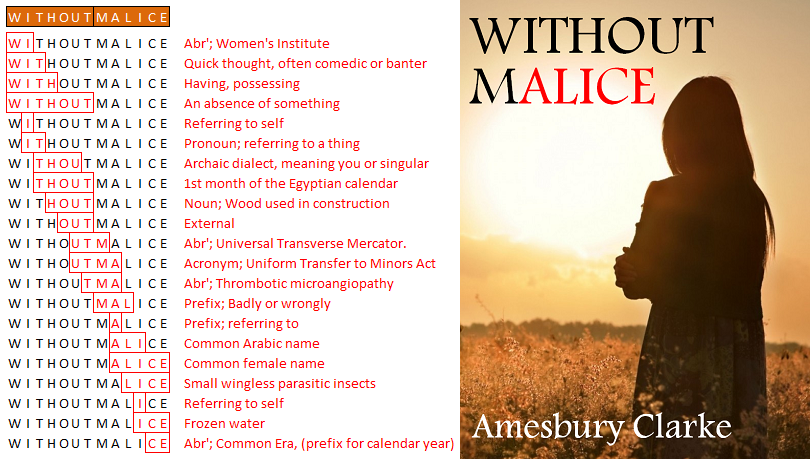
What do we learn/discover from this? There's often a lot more hidden than we first perceive. This can be true and relevant to so many people and things. It's certainly relevant to the story of Alice.
-- Blog 4 --
20th April 2024
20th April 2024
How important is a title?
As much as we shouldn't, we all do judge a book by its cover. We form a first impression of everything and every person we meet, even if that impression is subconscious. And in terms of books the title is a big part of that initial attraction.
So my question, what is your first impression of 'The Sword Swallower's Recipe Book'?
Early market research is suggesting that people don't get the joke, that 'The Sword Swallower's Recipe Book' is not in fact about food, so I'm toying with a few alternative titles in an effort to promote the book as what it is, a comedy capers travel adventure. BUT, I still want to keep the Sword Swallower's subject in there, as it relates to a scene in the book.
My list of alternative titles being considered is as follows:
The Sword Swallower's Picnic
The Sword Swallower's Breakfast
The Vegan Sword Swallower's Travel Companion
The Sword Swallower's Stew
I'm swaying very much towards 'The Vegan Sword Swallower's Travel Companion', perhaps with the addition of a sub-title in brackets: (A comedy travel adventure like no other), or something along those lines.
Feel free to share your thoughts on the social media platform formerly known as Twitter. Title again!, personally I can't stand calling it 'X', it just doesn't roll very nicely off the tongue, and I find it quite difficult to reference in conversation or in media posts without having to add a brief explanation alongside the X.
So, is a title all that important. In most cases, personally I think it is.
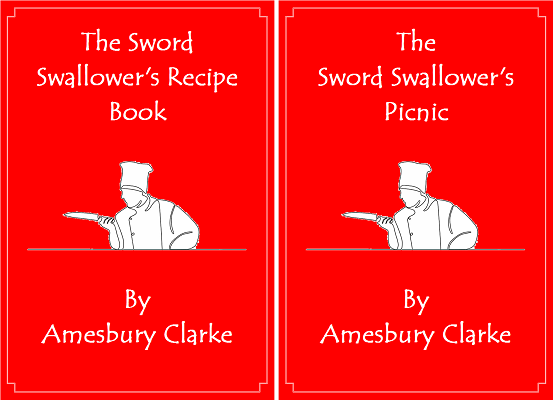
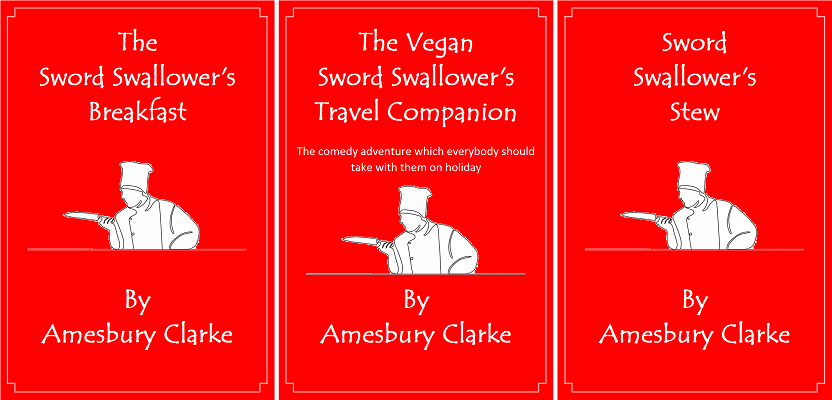
-- Blog 3 --
4th March 2024
4th March 2024
Please pop over to this wonderful charity page, supporting nature by caring for sick and injured hedgehogs and returning them back to the wild.
A signed copy of my book 'Without MAlice' has been donated to the auction with all proceeds going direct to the charity.
There's also lots of other items available in the auction too if the book doesn't take your fancy.



-- CLICK TO VISIT THE SIGNED BOOK CHARITY AUCTION --
-- Blog 2 --
21st January 2024
21st January 2024
So, I finally figured out where the Amesbury Clarke quotes on 'QuoteFancy' came from. They've been pilfered from my Goodreads profile!
https://www.goodreads.com/author/quotes/23094227.Amesbury_Clarke
No objections of course, I kinda like what they've done with them. Would love to hear other people's favourite quotes, there's so many my brain's probably forgotten two thirds of them.
In other news, hope everyone's been enjoying the recent snow. It's been reminding me of a dream I've had since childhood, to adopt a family of excitable/playful penguins.
One day, (*keeps on dreaming...).






Back to writing news:
53,000 words now written for my forthcoming comedy capers adventure, 'The Sword Swallower's Recipe Book'.
I shall be scribbling/composing more pages this afternoon and (likely) continuing long into the evening.
I'm considering the possibility of sharing a few teaser snippets in my next blog, but, we'll see...
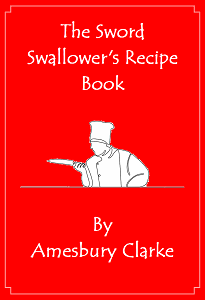
Coming Soon...
-- Blog 1! --
7th January 2024
7th January 2024
Well, the start of 2024 has been ALL of the exciting!
 And what a year 2023 was too.
And what a year 2023 was too.
After a busy 12 and a bit months I now have a website, and I also have a blog, which amused me instantly when I realised I'd missed the 'l' out of the word 'blog' so I had to go back to amend it. My first novel, 'Without MAlice', is doing well, receiving a modest trickle of flattering reviews, for which I thank my readers warmly. Your feedback means a lot.
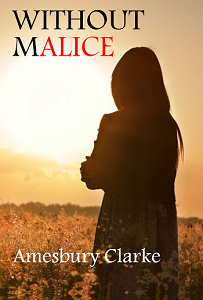
Additionally my first venture into the world of comedy writing has also been released in a compendium along with a group of other talented author's works (*released 3 months before I thought it was due out, which caught me completely off guard and excitedly panicking! The wonderful surprises of miscommunication).
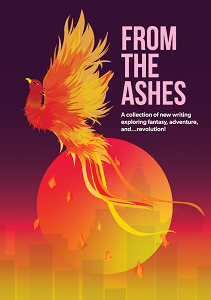
Amongst other works, I'm currently in the process of writing more comedy, 'The Sword Swallower's Recipe Book', which isn't a recipe book at all (which is the first joke in the book). I can't say too much about it just yet, but keep watching this blog for further details to come...






